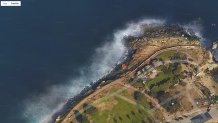San Diego officials announced Tuesday that the city was pursuing an emergency permit that would allow it to ban visitors from another beach in the heart of La Jolla.
Authorities described the effort, which, they said, was "informed by California Coastal Commission guidance," as an effort to "protect visitors and marine life." The closure sought at the tip of Point La Jolla would start at Boomer Beach and end at a nearby stairway leading down to the bluff, and would be temporary, according to officials.

The emergency coastal development permit would block visitors from passing over the seawall to an area where harbor seals have established a rookery.
Get top local stories in San Diego delivered to you every morning. >Sign up for NBC San Diego's News Headlines newsletter.
"We have called for responsible tourism, met with stakeholders, installed new signage, and yet crowds continue to seek up-close encounters with the sea lions," Councilmember Joe LaCava, who represents Council District 1, which includes La Jolla, said in a statement sent out by the city on Tuesday, adding that, "The spectacle of the past few months does not reflect who we are as a city and has distracted the public from [the] enjoyment of San Diego's world-class natural resources."
The area in question is just around the corner from La Jolla Cove, and a few blocks north from the Children's Pool in La Jolla, where animal activists and others have been at odds for decades over the presence of marine mammals.
Local
In a YouTube video posted in 2018, what appear to be hundreds of people are milling about Boomer Beach, looking at the seals and sea lions.
If approved, the permit applying to Point La Jolla would go into effect starting as early this week and last through the end of pupping season, which officials pegged at Sept. 15.
Richard Miller, the San Diego chapter director of the Sierra Club, told NBC 7 that he and others had been fighting for the beach ban for the past two years.
"This is one of the only major rookeries of sea lions, actually, on the entire West Coast, and this is the only one in Southern California," Miller said. "Otherwise you have to go to the Channel Islands, actually.... and the fact that this is in an urban setting really sets up the city and our tourists to really get close and be able to actually see the sea lions themselves."
At issue are tourists and other visitors who oftentimes approach the seals for photos near the animals, and protective mothers can become aggressive in defense of perceived threats against their young. Miller said that the females typically bark at intruders, but the males "can be very aggressive and they will actually chase them."
"The problem with the sea lion pups is: They do not swim when they are born and it takes up to about four months before they can swim well," Miller said. "So if people get up close to them, then what happens is they can actually drown."
Officials also said on Tuesday that they have begun mulling a seasonal closure at the site similar to what is in effect now at the Children's Pool.
The Children's Pool was opened in 1932 after Ellen Browning Scripps paid for a seawall to be built so that inexperienced swimmers could enjoy the beach. Seals started to use the relatively calm water of the beach to rear their pups in the 1990s.
A yearly closure was originally approved by the San Diego City Council, San Diego Planning Commission, mayor’s office and California Coastal Commission in 2014. The deal was renewed unanimously in 2019 for an additional 10 years. Those closures begin in December and run through May 15.
A group advocating for beach access called Friends of the Children's Pool sued the city arguing that the closure violated the California Coastal Act & Marine Mammal Protection Act.
A lower court sided with the group but the issue was resolved in the city's favor in 2018 when an appeals court reversed the decision, allowing the city to close the beach for 5 1/2 months each year.



